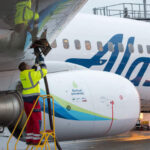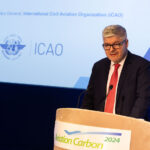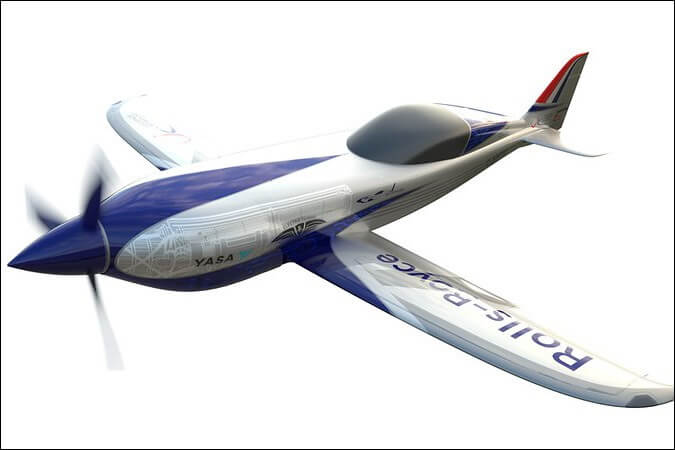Rolls-Royce has completed ground testing of an aircraft that will aim to break the world speed record for all-electric flight early next year. The technology has been tested on a full-scale replica of the plane’s core, called an ‘ionBird’, that includes a 500hp electric powertrain and a battery with enough energy to supply 250 homes. The plane is part of an initiative called ACCEL – short for ‘Accelerating the Electrification of Flight’ – with half the funding for the project being provided by the Aerospace Technology Institute (ATI), in partnership with the UK government’s Department for Business, Energy & Industrial Strategy (BEIS) and Innovate UK. Rolls-Royce has also agreed to partner with ATI and Boeing on a three-month accelerator programme to support and back start-ups creating sustainability-enabling technologies to help the UK aerospace industry innovate and recover from the Covid pandemic.
“Rolls-Royce is committed to playing a leading role in reaching net zero carbon by 2050,” said Rob Watson, Director – Rolls-Royce Electrical. “The completion of ground testing for the ACCEL project is a great achievement for the team and is another important step towards a world record attempt. This project is also helping to develop Rolls-Royce’s capabilities and ensure that we remain a leader in delivering the electrification of flight, an important part of our sustainability strategy.”
The testing involved running the propeller up to full speed of approximately 2,400 rpm using what Rolls-Royce claims is the most power-dense battery pack ever assembled for aircraft propulsion. Over 6,000 cells are packaged in the battery for maximum safety, minimum weight and full thermal protection, it said. Other companies involved in the project are YASA, a manufacturer of axial-flux electric motors and controllers for automotive and aerospace applications, and Electroflight, a technology and engineering services business that supplies bespoke battery systems for the aerospace sector.
The first flight is planned for later this year, with an attempt on beating the current all-electric flight world speed record expected to follow next year. The project is also the first at Rolls-Royce to use offsetting to make the whole programme carbon neutral.
“The ACCEL team is pioneering the integration of high-performance batteries, motors and drives to deliver an electric propulsion system in an ambitious flight test programme. These technologies and the systems integration needed to utilise them hold great potential for future sustainable aviation, which is why the ATI is proud to support the project,” said the ATI’s Mark Scully, Head of Technology for Advanced Systems & Propulsion.
Added UK Business and Industry Minister Nadhim Zahawi: “The completion of ground testing for the government-backed ACCEL project is not only a step towards an exciting world record attempt, but a leap towards developing all-electric and hybrid-electric planes that one day could ferry large numbers of passengers around the world.”
Created by the ATI and Boeing, and run by leading European accelerator Ignite, Rolls-Royce is joining the accelerator programme’s second cohort, which has opened applications to invest into sustainability-enabling start-ups that will benefit the UK aerospace industry across three key areas of focus: Industry 4.0, Lifecycle and Resilience, and Energy. This includes innovative energy and energy storage solutions such as battery lifecycle optimisation, alternatives for rare earth materials, hydrogen management solutions and sustainable aviation fuels.
Selected companies may receive £100,000 ($128,000) equity investment from Boeing HorizonX Global Ventures, together with first-hand access to strategists and technical experts from the programme’s partners and corporate sponsor GKN Aerospace. In light of the new Rolls-Royce partnership, applications for cohort two have been extended and will close on October 4. The programme will be running two cohorts a year, with each cohort made up of 8-10 start-ups, and is open to companies domiciled outside the UK.
“Having worked alongside the ATI, Boeing and GKN Aerospace, we’ve seen how much start-ups appreciate the access to top-class resources that these companies offer and we are incredibly excited about the opportunities that our next cohort will receive through our partnership with Rolls-Royce,” said Gabi Matic, Programme Director at ATI Boeing Accelerator.
In July, the ATI launched the government-backed FlyZero project with the aim of accelerating the adoption of more sustainable technology solutions and achieve zero-carbon commercial flight by the end of the decade. It plans to identify the zero-carbon technology solutions that could bring the largest impact to reducing overall aviation emissions in support of the UK government’s 2050 net-zero objective. An overview of the project was presented in a webinar held in August.
Photo: Rolls-Royce ACCEL















More News & Features
UK government sets out new Jet Zero focus and launches consultation on CORSIA global emissions scheme
New study highlights differing strategies and barriers to decarbonising aviation in UK and Europe
SITA teams with Arab airlines on developing technology to enhance flight sustainability
European aviation players launch Project SkyPower to drive investment in e-SAF and meet EU and UK mandates
Cambridge report sets four goals to be implemented by 2030 for global aviation to reach Net Zero
Alaska Airlines invests in innovative commercial blended-wing body aircraft developer JetZero